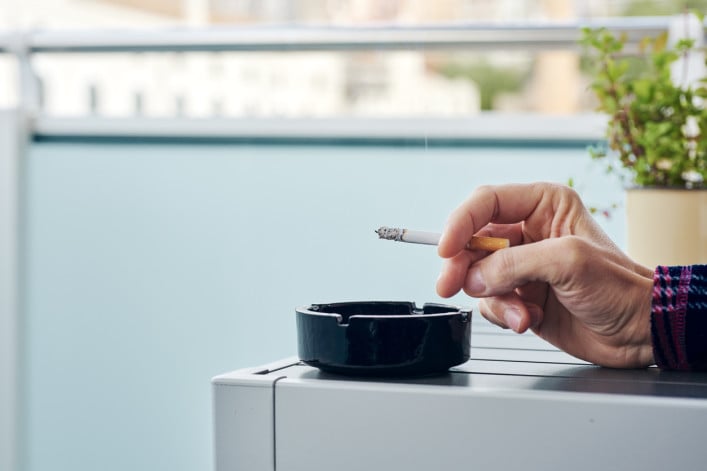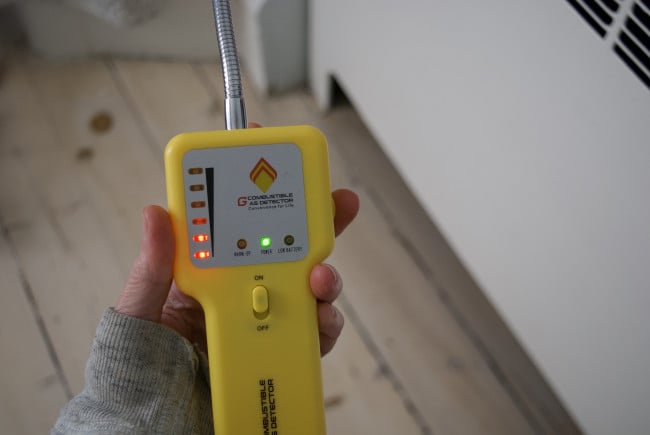How do I keep my neighbor’s smoke and cooking odors out of my apartment?
- Seal your front door, use an air purifier or fans to keep cooking smells away
- Ask your building manager to test whether exhaust fans are working in your building
- Be upfront with your neighbor or ask you building manager to clear the air

Second-hand smoke is a common problem in apartment buildings. Improving your apartment's air circulation can help.
iStock
Whether my neighbors are smoking cigarettes, burning incense, lighting up, or cooking food, the odor seems to waft into my apartment. What can I do to block out unwanted smells?
Even if you love your neighbors, chances are you don’t want to smell them all the time. Unfortunately, it can be pretty difficult to keep annoying smells out of your apartment.
“This is a very common problem in multifamily housing,” says Michael Leone, a managing partner at New York City-based engineering consultancy ads Engineers. “It is very difficult to mitigate because odors just permeate spaces. It's hard to control.”
If you can’t get your neighbor to crack a window, you can make sure windows and doors are airtight, get your own air filter, and check your exhaust fans to make sure they’re cycling air through your building. And if you continue to have problems, you can ask your building manager or landlord for a few mechanical fixes.
Read on for a few steps you can take to clear the air in your home, or with your neighbor.
[Editor's Note: Realty Bites tackles your NYC rental questions. Have a query for our experts? Drop us an email. We respect all requests for anonymity.]
1. Seal up your home
If you’re not a smoker, coming home and finding that your bathroom reeks of second-hand Marlboro's can be a nauseating nuisance.
It’s not uncommon for smells—cooking or otherwise—to leak into an apartment through cracks in your door or windows, says Jorge Fontan, an architect and owner of Fontan Architecture.
If the annoying odor is coming from outside your street-facing windows, or from a window that abuts your neighbor’s, make sure to close those up when you can. You should also check whether the doors into your apartment are closing correctly. If you shut your door and turn your lights off, but can see light coming from your hallway, your door isn’t snug enough against its frame, Fontan says.
You can ask your building manager or landlord to replace your door, or invest in a draft-stopper—a strip that helps seal the bottom of your door. (As a bonus, it also helps keep out drafts and insects ).
2. Be a fan of your fans
If you’re lucky enough to have a ducted hood above your kitchen stove, use it, Fontan says. Ducted hoods suck up air and pump it outside your building, helping replace the air in your apartment and clear out odors.
Installing one of these hoods can be a huge help at eliminating cooking smells, Leone says. But NYC does not require apartments to have ducted hoods, so if you’re without one, you’re unlikely to get one, Fontan says.
“The ducted hood blows the air from the stove straight out of the building. That does a much better job,” Fontan says. “But doing that retroactively is really unlikely, unless you’re completely gutting an entire building.”
All apartments are required to have a kitchen window or form of mechanical ventilation that replaces the entire volume of a kitchen’s air six times per hour, according to the NYC Administrative Code. Usually this comes in the form of an exhaust fan, which looks like a grate in your wall. While exhaust fans and windows are less effective than a ducted hood, they should still help remove odors in your apartment.
3. Invest in a portable air filter
Purified air can be a real scent for a sore nose. Portable air purifiers can do wonders for your home, plus help improve the air quality of your apartment on smoggy days. These filters also include a handful of technologies—such as “high-efficiency filters, ultraviolet light and carbon”—that help absorb odors, Leone says.
But purifiers can run in the hundreds to thousands of dollars. The least expensive purifier on Insider’s top five picks lists at just under $60, and that’s without including the cost of replacing your air purifier filter.
For cheaper options, you can turn to more natural remedies. HGTV recommends using a mesh or cotton bag of activated charcoal to help neutralize smells in small spaces. An open box of baking soda also helps absorb odors, particularly food smells.
4. Ask your property manager or landlord for help
There’s a limit to how much anyone can do to stop unwanted smells, so if you’re having persistent problems, it might be worth checking in with your property manager or landlord about a building-wide fix, says Mark Levine, a principal at the property management firm EBMG, which manages more than 100 residential buildings in NYC.
First off, check your kitchen and bathroom fans to make sure they are pulling air at an effective speed. Levine recommends putting a piece of toilet paper up against the fan and seeing if it is powerful enough to keep the toilet paper suspended when you pull your hand away. If the paper falls, your building’s roof fan likely needs to be inspected, Levine says.
“One of the bigger problems is if the building hasn’t been keeping up with the maintenance and operation of their roof vent fans, that’s definitely something that could cause trouble where the air is not able to move out of the apartment and smells are going to linger,” Levine says. “That’s probably the most common factor.”
You should also check to make sure any hallway doors are properly closing, Levine says. By law, both apartment and hallway doors are required to shut and latch by themselves to help stop fires from spreading. Self-closing doors can also help keep unwanted smells from spreading around within a multifamily building, Levine says.
5. Talk to your neighbor
If you know which neighbor is causing an annoying scent, consider gently asking them if they have to let it linger. If they are willing to crack a window, use their ducted hood, or walk outside to smoke, a conversation is likely to be a much cheaper (and easier) option than jumping the gun on an air purifier.
But if you want to avoid a potentially awkward chat, your property manager can help clear the air with your neighbor, Levine says.
“The benefit of having management is that we don’t live on the property, so when we have to take heat and have uncomfortable conversations on behalf of some tenants it helps not to live there,” Levine says. “If the tenant is doing it they may feel that whenever they step in an elevator with somebody, it’s a negative interaction.”
There’s also a chance your lease includes specific language discouraging “objectionable conduct,” meaning anything that makes the apartment or building less fit to live in for other tenants. (EBMG’s standard leases and co-op subleases both include clauses to this effect).
Make sure to check your lease agreement for its specific protections. Levine also advises tenants to document when an olfactory issue begins, where it’s coming from, and how long it persists.
You Might Also Like





























